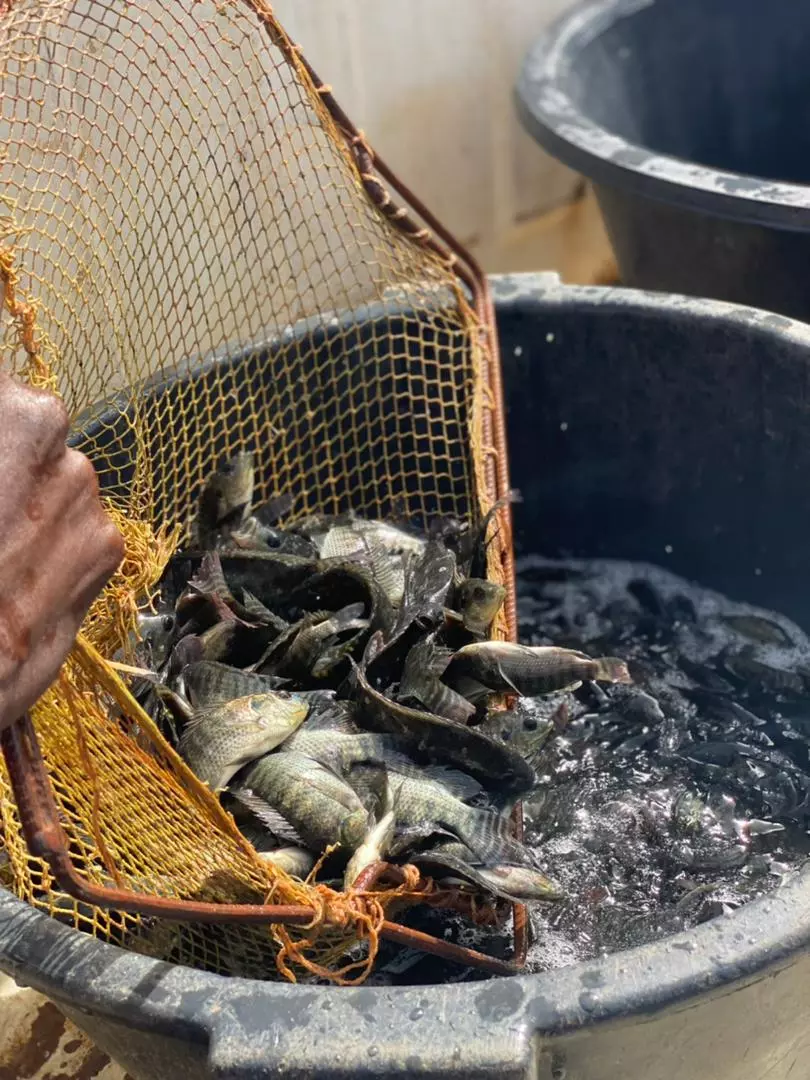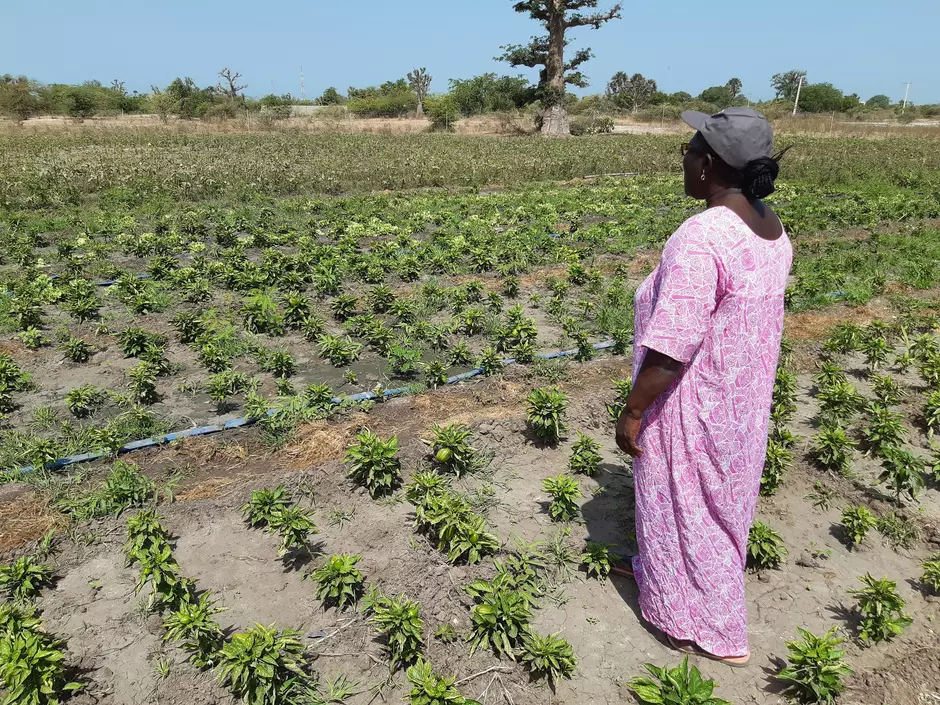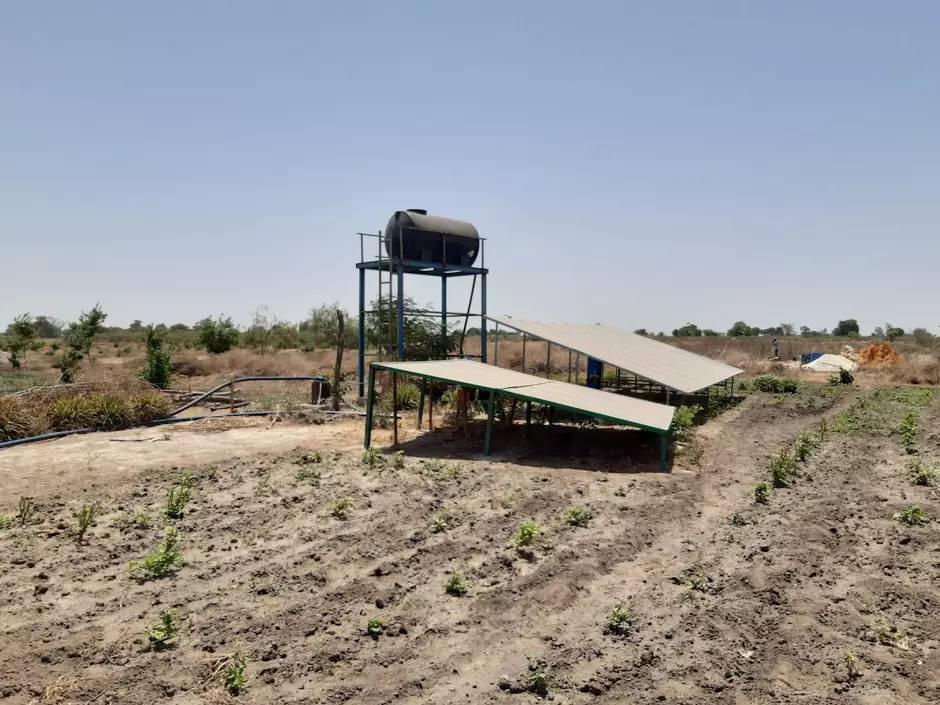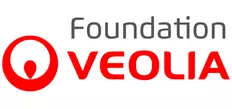The emergence of new forms of aquaculture is a necessity. There will soon be 9 billion people to feed. And we know that our resources are limited: we can no longer produce our food by destroying them, disrupting our ecosystems, emptying the ocean... Our ability to innovate, and in particular to create or recreate virtuous and sustainable food chains, is a key element in our ecological transformation.
This is the essence of the project supported by the Veolia Foundation and carried out by two players in the sector: the Agence nationale d'aquaculture (ANA) in Senegal and the Institut océanographique Paul Ricard (IOPR) in France.
A simplified aquaponics model
The system is based on an above-ground fish pond built three meters above ground, in the middle of fields. A drip system allows 5,000 m² to be watered twice with water enriched with nitrogen, phosphate and potassium by the fish. A well is equipped with a pump that sends water to the pond inlet. At each end of the pond, two outlets, each with a valve, allow gravity watering of the market garden.
The first results are tangible: market garden production increases by more than 20% thanks to the enriched water that irrigates it. And, above and beyond his vegetable production, the farmer is able to produce around 7,200 kg of fish (tilapia) per year in two production cycles.

This aquaponics program, called Ar Jeeguen, is supported by ANA, which identifies potential sites and project leaders. Among these are highly committed Senegalese women, who have formed an economic interest group (GIE) to manage the ponds, a vehicle for economic emancipation.
The first farms benefited from a repayable subsidy to finance the creation of the ponds and the supply of inputs to ensure first-year production. Repayment by the beneficiaries enables them to finance another pond and ensure the replicability of the model.
Aquaculture feed research in France
In the Var region of France, the Institut océanographique Paul Ricard (IOPR) has been working since 2018, with the support of the Veolia Foundation, on the development of an aquaculture feed based on insect proteins. A formulation based on worm meal was successfully tested in 2020. IOPR wants to go even further, and has developed a platform on the island of Les Embiez in the Var region of France to house the research efforts of its teams. The ambition is to test more virtuous and sustainable inputs such as soldier fly worms and marine worms. The ultimate aim is to improve the food intake of tilapia.
The Senegalese ANA and IOPR teams were not previously acquainted, but the Veolia Foundation wished to pool the support granted to these two initiatives, which it is renewing. The challenge is to organize the collaboration between IOPR and ANA, in charge of deploying the aquaponics model, around a low-tech model of fish and aquaponics production.
A collaboration rich in potential
ANA will contribute its expertise and ability to organize technical training courses for farmers. When the time comes, it will also be able to support the scaling-up to the Senegalese territory.
As for IOPR, it will attempt to identify levers for optimizing fish farming production and will offer aquaculture training courses in its laboratory dedicated to aquaculture practices. Housed on the Embiez marine platform, it aims to become an inter-regional center of expertise with an international outlook. By encouraging cross-fertilization on a subject of general interest, the Foundation aims to encourage the emergence of sustainable, replicable models.
Avenues for improvement
Among the difficulties encountered, and having a direct impact on the operating budget of the EGIs, was the issue of the timely supply of high-quality fry. The fry available on the market do not always meet the quality and growth requirements for profitable production. Discussions with the ANA and the IOPR led to a proposal to create a local hatchery for the reproduction and hatching of tilapia eggs. The aim is to guarantee the supply of fish farms and even to sell surplus stock.
The infrastructure was inaugurated in early 2025 in the presence of Senegal's Minister of Fisheries, Maritime and Port Infrastructure, Dr. Fatou Diouf.
Another area for improvement is the use of diesel to power irrigation pumps, which creates energy dependence and fluctuating costs that affect the economic balance of farms. A grant from the Picardy Intercommunal Water Syndicate has made it possible to solarize the irrigation pumps by installing solar panels at the heart of the farms.
In 2025, the Diam Fao aquaculture farm encountered a difficulty: laboratory analyses showed that the water pumped via the existing borehole was brackish. The very high salinity level makes the water unsuitable for market gardening. The economic model is weakened. With the support of the Veolia Foundation, a newly constructed borehole allows water to be drawn from a depth of 75 meters to reach the freshwater aquifer. The goal is for the women of Diam Fao to continue their aquaculture activities.
From experimentation to replicability of the model, the program called “Aar Aduna – Aar Jiggen” has become a benchmark far beyond the region. “Aquaculture is now a national priority, with enormous potential to meet the growing demand for fish products. With global production of aquatic animals now exceeding that of capture fisheries, aquaculture is a sector with a bright future for Senegal,” explained Minister Fatou Diouf.
Environment & biodiversity
- Locations:
Senegal
Les Embiez (France) - Sponsors
Pierre Ascencio
Mathilde Nithart
Thierry Vandevelde
Marie-Thérèse Laguerre - Grants:
€50,000 to the Selection Committee on March 16, 2020
€300,000 to the Board of Directors meeting of 17 May 2021
€90,000 to the Board of Directors meeting of 22 November 2021
€150,000 to the Board of Directors meeting of 12 June 2023
€15,000 to the Selection Committee on April 1st, 2025
Project leaders
Paul Ricard, Oceanographic Institute / Institut océanographique Paul Ricard (IOPR)
National Aquaculture Agency / Agence nationale de l’Aquaculture (ANA, Sénégal)
GIE Arr Aduna Arr Jiguen
What is aquaponics?
Aquaponics combines aquaculture and hydroponics.
- Aquaculture is the farming of fish and plants in an aquatic environment.
- Hydroponics is the cultivation of plants on a substrate regularly irrigated with a nutrient solution.
Aquaponics uses water from a fish farm to fertilize plant crops.
Economic empowerment for women's MSEs

The project has led to the creation of four women's MSEs in the central region of Senegal, to manage the same number of ponds:
- 2 in Mbodiène (commune of Nguéniène);
- 1 in Fao (commune of Ndiaganiao);
- 1 at Keur Allé (Pékèss commune).
These groups are monitored by ANA and supported by an agricultural technician thanks to funding from the Veolia Foundation. In May 2023, a Veoliaforce volunteer went on site for technical training and to set up procedures for good farm management.
SIE Picardie to solarize irrigation pumps

Thanks to the support of the Syndicat intercommunal des eaux de Picardie, a local partner was able to organize the solarization of the irrigation pumps. The solution makes it possible to
- Empower the MSEs responsible for operating the basins;
- Reduce operating costs;
- Improve the environmental footprint of the system.

